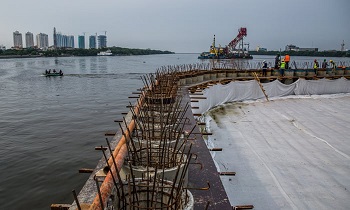 Tuesday, September 24, 2024
Tuesday, September 24, 2024  Tuesday, September 24, 2024
Tuesday, September 24, 2024 
As reported in The Diplomat, Indonesia’s president said in an interview that he wants to see the speedy construction of a giant sea wall around Jakarta to prevent the low-lying capital from sinking under the sea, lending renewed backing and a sense of urgency to a slow-moving and politically contested mega project.
President Joko Widodo and his government are up against a tight timetable, including a forecast by experts that at the current rate, one-third of Jakarta could be submerged by 2050.
Advertise YOUR business on Construction Links Network – Download the media kit
The existential crisis facing the city is the culmination of decades of unfettered development, almost nonexistent urban planning and misrule by city politicians who have served private interests over those of the public.
Lacking a comprehensive piped water network, industry and homeowners have tapped into the city’s aquifers, causing rapid subsidence in northern Jakarta, home to several million people.
In this area, the swampy ground has been sinking at an average of about 10 centimeters (4 inches) a year. Rising sea levels from a heated-up planet will compound the problem in decades to come.
Widodo told The Associated Press on Friday that it’s time to move ahead with the sea wall, a project the government first began to consider a decade ago. “This huge project will need to be done quickly to prevent Jakarta from sinking under the sea,” he said in the interview at a humble restaurant serving spicy Indonesian dishes.
The president said he’s determined to push through key projects and reforms, even if potentially unpopular, noting that he’ll be less constrained by domestic politics in his second and final five-year term. Widodo was reelected earlier this year.